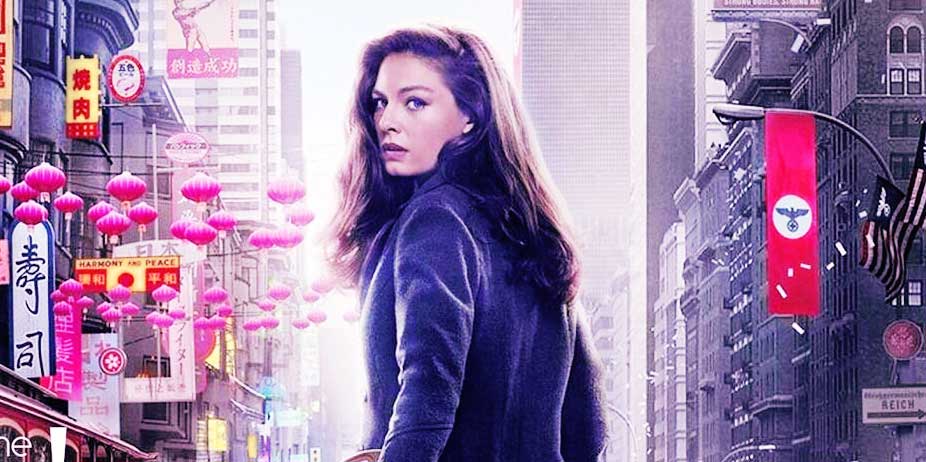 The
Man in the High Castle: Season Four (2019)
The
Man in the High Castle: Season Four (2019)
One of the most creative shows on offer today, The Man in the High Castle has always been intricately plotted and character driven. The final season brings the conflict to a head by bidding farewell to some beloved characters and introducing others. The result is an intense final ten episodes that have high and low points.
Seconds after being shot by Nazi official John Smith in her universe, Juliana Crain (Alexa Davalos) lands in the alternate reality, where the Allies won the war. She spends the next several months teaching Japanese fight techniques and gathering evidence, in her concern that the Nazis intend to "invade the multi-verse" with their portal into other worlds. She spends her free time consorting with "this" world's John Smith, a traveling salesman, and his wife and son Thomas, hoping to grant some insights into "her" version of Smith. But she is running out of time, since they are aware of her presence and intend to stop her.
Back in her universe, the Resistance is crumbling in Denver, where Smith has ordered an all-out assault on the Neutral Zone as retaliation for the attempted assassination of the Furor. His estranged wife Helen (Chelah Horsdal) has fled to her brother's ranch in Montana with their two girls, but Berlin has taken notice of her considerable absence and are considering her a potential liability. Smith takes his daughters back to New York, to attempt to resolve the damage, but it may be too late to prevent an all-out investigation, questioning his allegiance to the State that "terminated" his ill son.
On the east coast, the Japanese experience upheaval at the assassination of a prominent, peace-promoting official. Inspector Kido (Joel de la Fuente) takes responsibility for the investigation, which wears hard on him while attempting to wrangling his PTSD-stricken "war hero" son out of his depression. The Japanese also must contend with the BCR, the Black Communist Rebellion, a new group who wants equal rights and to chase the Japanese out of the east coast. Juliana's associate, Wyatt, wants to align with them in an attempt to assassinate high-ranking Japanese officials. They plan to do so at a public auction of "Americana" held by the prestigious, social-climbing Robert Childran (Brennan Brown), oblivious to the devastating consequences.
I met this season with a mix of anticipation and dread, full of hopes of what might unfold. The show met some of them, and gave me disappointments in other ways. Several important characters died last season, and this season either kills off some more, or forgets they existed. (Not only is Ed nowhere to be seen, we never know what happened to him, and must assume him dead.) Presumably because they could not get the actor back, Tagomi dies within seconds of the season four premiere -- and his absence is keenly felt. He was in many ways the heart of the series, a man of quiet, insightful peace and intelligence. In his place, we get a bunch of intense, but not very well fleshed-out new characters. Juliana also takes a backseat to her own story, in favor of the Smiths and Kido. Which is fine, because she's such a secretive, internal character there is not a lot to do with her. The Smiths are far more interesting, and provide all the tension this season, between the constant threat of their extermination and their crumbling marriage. John passes into the other world and has his views shaken.
The ending ties up a few things, but not everything; it doesn't tell us what happens to a bunch of characters, while being very final for others. And there was, I admit, where I felt a little bit of disappointment. The show moves around so much, jumping back and forth, and assuming we know who people are, that it can be hard to follow the subplots. I was not happy where one plot twist wound up (I had higher hopes for that character), but I found the romance for Childan touching. The BCR also was quite short-sighted (did they think if they ran out the Japanese, that the Nazis would simply allow them to exist as their own country?). It's a solid wrap-up to a series that in many ways defined itself by being unorthodox and creative, but it felt a little disjointed, and needed a tighter focus on only the essential characters.
Sexual Content
A graphic sex scene in episode 2 (movement, noise); a man visits a
topless bar in episode 3 (the scene is about five minutes long, and has various
women walking around). Toward the end of the season, Rebels sing a dirty song
about the "balls" of Nazi officers. Various scenes of implied intimacy (couples
waking up in bed with bare shoulders and the sheets pulled up).
Language:
Hundreds of f-words. Jesus' name is abused a half dozen times. Slang for
racial groups. Exclamations of GD. Misc.
Violence:
Infrequent but usually gory. Men/women are stabbed, shot
at, bludgeoned, strangled. Blood spurts. A train derails, killing various people
on board. A man is smothered with his own oxygen mask. Bombs level Denver in the
Neutral Zone.
